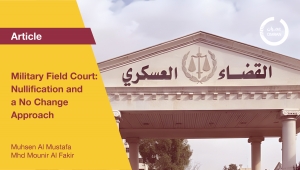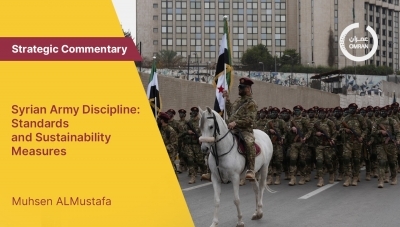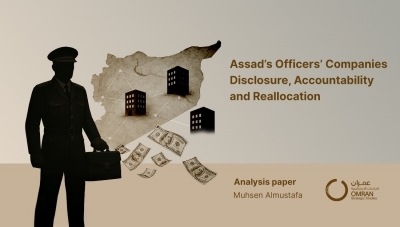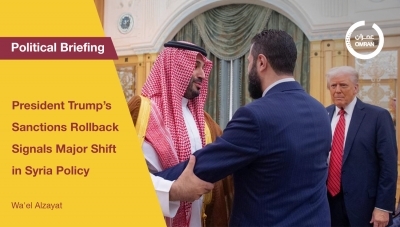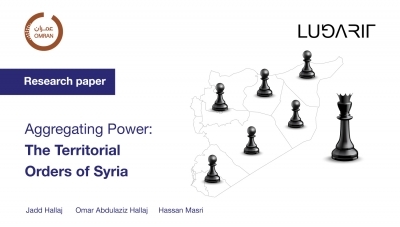Media Appearance
Military Field Court: Nullification and a No Change Approach
On September 3, 2023, Bashar al-Assad announced Legislative Decree 32 of 2023(1), which nullified Legislative Decree 109 of 1968 and its subsequent amendments. Which eventually had established the Military Field Court(2). With this new decree, all ongoing cases will be transferred to the military judiciary, where they will be prosecuted under the Penal Code and Military Procedure and its amendments(3).
The Military Field Court was initially set up in the aftermath of the Six-Day War of 1967. Its primary purpose was to address crimes that fell under the jurisdiction of military courts during times of war or military operations. Later, its scope was broadened by Hafez al-Assad through Legislative Decree 32 of 1980, allowing it to hear cases during "internal unrest" and thereby permitting civilians to be tried in this court.
It's crucial to note that this court does not meet basic litigation standards. It did not adhere to the principles and procedures outlined in existing legislation. Furthermore, its rulings, including death sentences, were final and not open to appeal. Death sentences required ratification from the head of state, while other sentences were approved by the Minister of Defense.
Historically, the court has been a tool for suppressing Syrian society. This was evident during the 1980s(4), and became even more pronounced after 2011. The security services frequently referred detainees to this court, where many faced the death penalty. Others were sent to “Sednayah Military Prison”, where they were systematically tortured to death(5) .
Despite the court's abolition, the situation will not change significantly. The security services still hold sway over the assessment and categorization of crimes. Over 100,000 detainees and forcibly disappeared individuals remain in the regime's prisons(6) . This suggests that changing the judicial tool does not necessarily alter the regime's behavior. The core issue lies in the fact that there is a governance defect in the military judiciary as a whole(7) . which is summarized by its connection to the executive authority represented by the Ministry of Defense and the connection of its officers to the security services. Moreover, the court has been a hub for financial extortion against detainees' families, generating millions of dollars through corrupt networks(8) .
Furthermore, the challenge of trying civilians in military courts persists. One of Syria's primary issues is the lack of an independent judiciary, both military and civilian. Bashar al-Assad, as the “President of the Republic,” presides over the Supreme Judicial Council, as per Article 133 of the 2012 Constitution(9).
The decision to abolish the court appears influenced by external pressures rather than domestic concerns. The Assad regime seems to be diverting international attention from human rights issues, state restructuring, and accountability. The regime is likely to continue with symbolic gestures, such as issuing new amnesty decrees, reducing military presence on public roads and dismissal of a number of conscripts and reserve personnel from the army. These actions are seen as superficial attempts to appease the international community amidst the regime's growing isolation and economic crisis.
The court's abolition is also seen as a move to pre-empt international legal actions against the Assad regime for torture crimes. This comes ahead of the “International Court of Justice's” hearings on the lawsuit filed by Canada and the Netherlands against the regime(10). The decision is also linked to the Arab initiative and the step-by-step approach, especially concerning refugees' legal and security concerns.
A significant aspect of this decision is the regime's attempt to distance itself from the Military Field Court's actions, especially since its reactivation in 2011. In accordance with paragraph (a) of Article 8 from the decree that established the court, death sentences required ratification from the head of state. This means every death sentence since 2000 has been directly approved by Bashar al-Assad.
The annulment of the military field court decree doesn't negate it’s on the ground application automatically. It's tied to other procedures, and mere superficial changes at the top aren't sufficient. Resorting to the military judiciary often leads to further repression due to significant loopholes. This judiciary's laws and its consistent use serve as intimidation tools.
The regime's decision to dissolve the court can be attributed to its strategy of handling enforced disappearances and murders. By operating within this exceptional judiciary and indirectly sending detainees to “Sednayah military prison”, this helps the regime circumvent the UN General Assembly (UNGA)’s decision to form an international mechanism to reveal the fate of missing persons in Syria. This move coincides with Canadian and Dutch efforts to hold the regime accountable at the International Court of Justice for violating the convention against Torture, which was ratified by the regime in 2004.
Previously the Assad regime abolished the state of emergency and the State Security Court in 2011(11). By 2012, they introduced the Anti-Terrorism Law and established the “Terrorism Cases Court”(12) . However, these changes didn't alter the regime's oppressive tactics. Instead, they intensified their crackdown through various courts, including military, field, and civilian ones. With the “Military Field Court's” dissolution, its alternative is already in place.
Genuine change in Syria isn't about switching litigation tools. It hinges on three unavailable criteria: judiciary independence, assigning case types to the Attorney General instead of security services, and a shift from emergency law dynamics. The distinction between judicial tools is merely administrative.
Real change in Syria requires a conducive political environment, an independent judiciary, and robust constitutional institutions that enforce the law. Local civil bodies must oversee the change process and safeguard citizens' rights. Without transparency and laws granting access to information, assessing change remains impossible, especially with the regime's secrecy around detainees and the missing.
For legal reform in Syria, two primary requirements stand out: First: abolishing the laws from which security agencies feed. Second: legally curbing the violations of security agencies, especially arbitrary detention, and torture, which are tools to silence and instill fear in citizens, their violations can be curbed through laws combating arbitrary detention in its three types, ensuring the foundations and rules of a fair trial, and combating torture.
In conclusion, the regime’s changing of the sole leadership system will remain symbolic and evasive captive to formalism, blackmail, and evasion, which has been its practice throughout the Baath era. Genuine change requires a political climate that involves all actors. While the regime might present this move (Abolition of the field court) as an extension of the Arab initiative or a political process step, it's likely a superficial response to growing internal unrest, particularly in Suwayda and southern Syria.
Human rights and civil society organizations must critically assess these developments. Political entities should push international players totem pressure the regime and its allies to address the fate of the missing, ensure a safe environment for Syrians' return, and earnestly participate in the political process, with Resolution 2254 at the forefront.
([1]) “Legislative Decree No. 32”, Sana, Publication date: Sep 03, 2023, Link: https://bit.ly/48AmAXB
([2]) “Bashar al-Assad ends the system of military field courts”, The new Arab, Publication date: Sep 03, 2023, Link: https://bit.ly/46i3Jiy
([3]) “The Penal Code and Military Procedure”, The Syrian Parliament, Publication date: Mar 13, 1950, Link: https://bit.ly/3Lh0EUh
([4]) “The Muslim Brotherhood Uprising in Syria (1979-1982) which comprised the Hama massacre”, EUAA, Publication date: September 2020, Link: https://bit.ly/3LKVD9V
([5]) “An Instrument of Death and Disappearance: How the Syrian Regime Uses Military Field Courts Against Activists and Dissidents” SNHR, Publication date: Sep 12, 2023, Link: https://bit.ly/46BuVZ4
([6]) SNHR’s 12th Annual Report on Enforced Disappearance in Syria”, SNHR, Publication date: Aug 30, 2023, Link: https://bit.ly/46z6w6
([7]) “Changing the Security Sector in Syria”, Omran Center for Strategic Studies, Publication date: Oct 23, 2017, Link: https://bit.ly/45jogSp
([8]) “Families of Syrian prisoners and missing persons 'paid $900 million' to find out the fate of their children”, BBC, Publication date: Sep 14, 2023, Link: https://bit.ly/3EZXbJ4
([9]) “Syrian Arab Republic 2012”, Constitute project, Publication date: Feb 27, 2012, Link: https://bit.ly/48Giihe
([10]) Application of the Convention against Torture and Other Cruel, Inhuman or Degrading Treatment or Punishment (Canada and the Netherlands v. Syrian Arab Republic)”, International Court of Justice, Publication date: July 15, 2023, Link: https://bit.ly/45irIwH
([11])“Syria announces lifting of state of emergency and cancellation of Supreme State Security Court”, the world of the homeland, Publication date: Apr 10, 2011, Link: https://bit.ly/3LJUv6l
([12])“Law 22 of 2012 establishes a Damascus-based terrorism case court”, The Syrian Parliament, Publication date: July 26, 1950, Link: https://bit.ly/3RrxSqP
Dr. Ammar Kahf | Will the Caesar Act defeat Syrian President Bashar al-Assad?
Dr. Ammar Kahf, Executive director of the Omran Center for Strategic Studies participated as a guest on Inside Story at Aljazeera English to discuss the latest Caesar Act and its impact on the Syrian regime. He highlighted that the root cause of torture, death, destruction and hunger has always been the regime of Bashar Assad. This is yet another tool that requires additional diplomatic and political mechanisms to put pressure on its sponsors and supporters to make their lives more difficult and think twice before normalizing or investing in reconstruction.
Other guests on the program included Joshua Landis and Alexey Khlebnikov. Sami Zeidan was the host of the program.
Source: https://bit.ly/3fHQmgy

